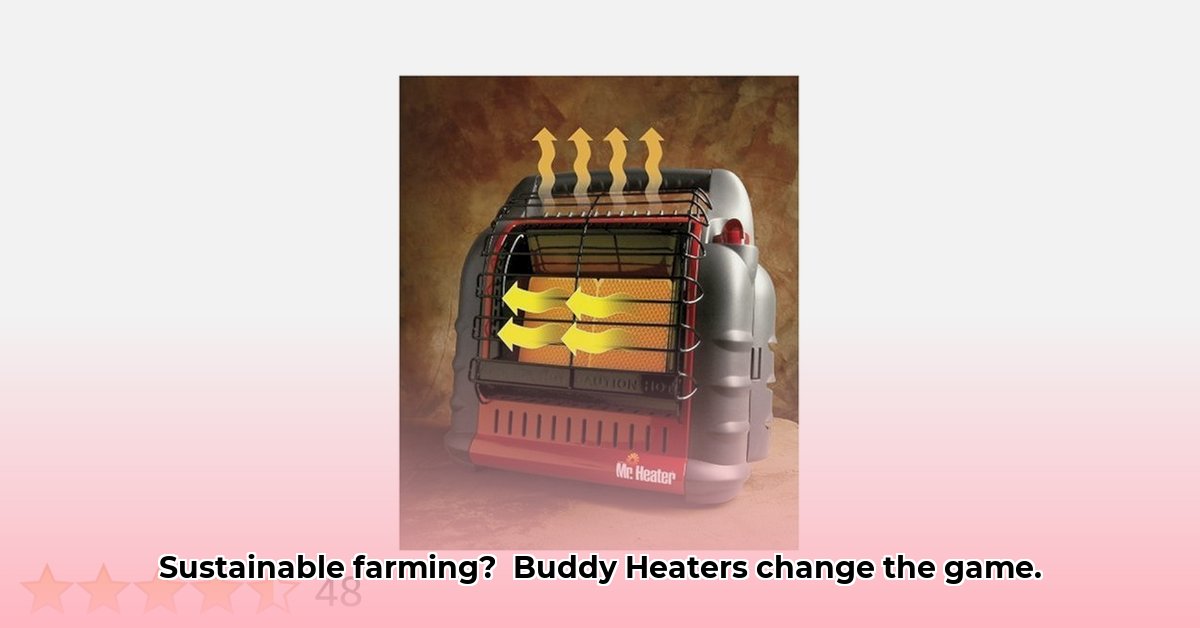
Keeping crops and livestock at optimal temperatures is crucial for successful harvests and healthy animals. Supplemental heating becomes essential during unexpected cold snaps or harsh winters. Tractor Supply's Mr. Heater Buddy heaters offer a readily available solution, but their sustainability and cost-effectiveness warrant careful consideration. For more details on Tractor Supply heaters, check out this helpful resource. This guide analyzes their use in agriculture, exploring their efficiency, environmental impact, safety, and cost-effectiveness, while also examining greener alternatives.
Propane Heaters: The Big Buddy and the Little Buddy
Tractor Supply offers two primary models: the Big Buddy and the Little Buddy. Both utilize propane, a readily accessible fuel, advantageous for farms in remote locations. However, propane's environmental impact necessitates a thorough assessment. While manufacturers provide BTU (British Thermal Unit) outputs—a measure of heat energy—independent verification remains crucial for accurate operational cost estimations. Precise BTU data is essential for comparing these heaters with other heating systems and for developing effective strategies to lower energy use.
Environmental Impact: Assessing Greenhouse Gas Emissions
Propane combustion releases greenhouse gases (GHGs), including carbon dioxide, a significant contributor to climate change. While buddy heaters can be vital for protecting investments, their environmental impact requires careful consideration. Mitigation strategies may include:
- Improved Insulation: Enhancing building insulation minimizes heat loss, reducing reliance on supplemental heating.
- Sustainable Practices: Offsetting propane emissions through carbon sequestration projects or other sustainable farm initiatives.
- Alternative Heating Sources: Exploring environmentally friendlier heating systems.
The trade-off between immediate heating needs and long-term environmental responsibility is paramount.
Safety First: Operational Guidelines for Propane Heaters
Safe propane heater operation is non-negotiable. Proper ventilation is critical to prevent carbon monoxide buildup, a deadly, odorless gas. Always adhere strictly to the manufacturer's instructions. Regular maintenance is paramount, including checking for leaks and ensuring proper functionality.
Key Safety Steps:
- Ventilation: Ensure ample fresh air circulation in the heated space.
- Placement: Keep the heater away from flammable materials (hay, curtains, etc.). Maintain a safe distance.
- Regular Inspection: Conduct frequent checks for damage or leaks. Address any issues immediately.
- Emergency Preparedness: Develop a comprehensive emergency plan and ensure everyone on the farm is familiar with it.
These precautions minimize the risk of accidents and ensure the safe operation of propane heaters.
Cost-Benefit Analysis: Weighing Expenses and Returns
Determining the economic viability of buddy heaters involves analyzing various factors: initial purchase price, ongoing propane costs, and potential benefits (increased crop yield, improved livestock health). A comprehensive cost-benefit analysis should compare the total cost of using buddy heaters to other heating alternatives for your specific situation. Does the increased crop yield or improved livestock health offset the cost of propane? This analysis is vital for informed decision-making.
Greener Alternatives: Sustainable Heating Solutions
Sustainable farming necessitates minimizing environmental impact. Several alternatives to propane heaters offer long-term advantages, although initial investments may be higher:
- Geothermal Heating: Utilizes the earth's stable temperature for efficient, clean heating.
- Solar Heating: Harnesses solar energy, reducing reliance on fossil fuels. While the initial investment is greater, long-term operational costs are significantly lower.
- Improved Insulation: Minimizes heat loss and reduces the need for supplemental heating, resulting in substantial energy savings.
Choosing the most appropriate alternative depends on the farm's size, climate, and budget.
Conclusion: A Balanced Approach to Farm Heating
Buddy heaters offer a readily available, convenient heating solution, but their sustainability and long-term economic viability deserve thorough consideration. While they might be a suitable short-term solution, a balanced approach is needed: combining efficient usage with a commitment to sustainable alternatives whenever feasible. Remember that minimizing environmental impact demands a comprehensive strategy, balancing immediate needs with a long-term vision of sustainable agricultural practices.